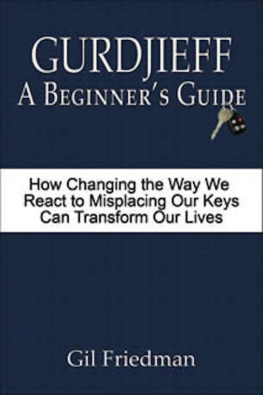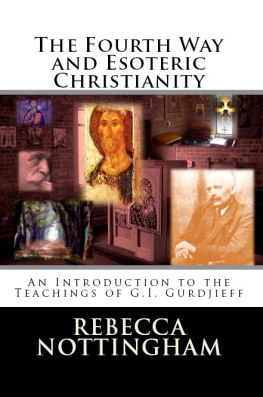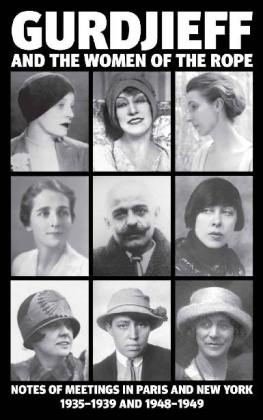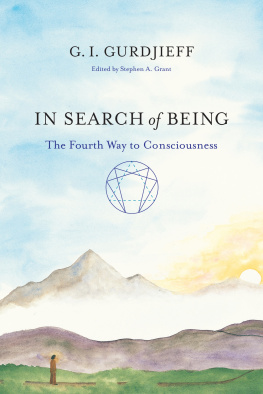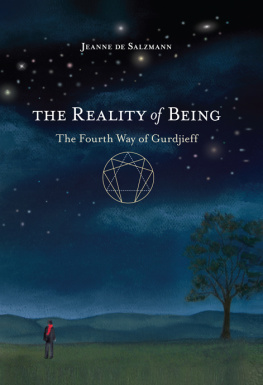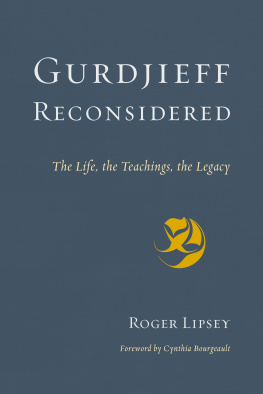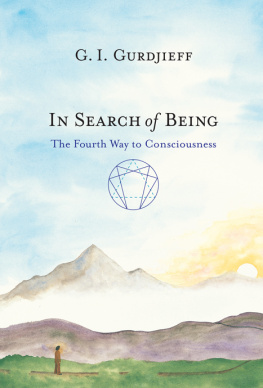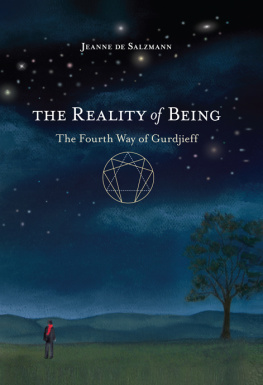Gurdjieff
A Beginners Guide
How Changing the Way We React To Misplacing Our KeysCan Transform Our Lives
Gil Friedman
Copyright 2003 Gil Friedman
Yara Press
Arcata, California
Smashwords Edition
Are You Ready for Self-Transformation?
Many spiritual teachers promise transformation,but Georges Ivanovitch Gurdjieff delivers. Gurdjieff (1872-1949)was born in Alexandropol on the border of Russia and Turkey. Aspiritual seeker in his youth, he spent twenty years traveling inAsia and the Middle East while developing his revolutionary systemof personal transformation.
Gurdjieff then settled in Moscow and startedforming groups in both Moscow and St. Petersburg. Gurdjieffsteachings contain many concepts and, taken together, are referredto as the Work. The idea behind the Work is that our first birth isour physical body, which is all we need to get through life. But weare capable of developing into something higher, just as an acorncan stay an acorn and die or develop into an Oak Tree, we candevelop into something higher. And whereas other methods oftenrequire the student to go to a monastery, sanctuary, or to retreatsto separate from ordinary life, the Work uses our ordinaryexperiences in life as the material we work on for ourdevelopment.
These ordinary experiences are not someinterruption to our lives, but exactly the material we need to workwith. This work can only be done by intentional efforts. Allmechanical efforts are useless. The Work emphasizes that many of usare in negative states without realizing it. And if there is anymantra in the Work it might be that we have the right not to benegative. The end result of our development is that we developourselves to a higher level, so we react differently to the eventsthat transpire in our lives, more consciously and lessmechanically.
Oftenchallenging and even esoteric, Gurdjieff offers a radicallyoriginal version of man and his potential forself-development. Gurdjieff, A Beginners Guide: How Changing the Way WeReact To Misplacing Our Keys Can Transform Our Lives is a beginning guide to theteachings of Gurdjieff. Practical and eminently readable, it leadsthe reader through some of the main concepts necessary forself-transformation.
Copyright 2003 by Gil Friedman
All rights reserved. No part of this bookmay be reproduced or utilized in any form or by any means,electronic, or mechanical, including photocopying or recording, orin any information storage and retrieval system, without permissionin writing from the publisher.
ISBN 0-913038-27-X
Readers interested in obtaining copies ofthis book or any other book by Gil Friedman can contact him at:
Yara Press
1735 J Street
Arcata, CA 95521
Tel. and Fax (707) 822-5001
www.GilFriedman.com
Other Books by Gil Friedman
The Goldwater Calendar: Time for aChange???
How to Buy and Sell a Used Car in Europe
How to Conduct Your Own Divorce in Englandand Wales and a Guide to the Divorce Laws
A Dictionary of Love
Love Notes: Quotations From the Heart
(An expanded version of A Dictionary of Love. It is an anthology ofover 650 quotations on love from the profane to the profoundarranged alphabetically into 211 subject categories by over 350authors.)
How to Be Totally Unhappy in a PeacefulWorld: A Complete Manual with Rules, Exercises, a Midterm and FinalExam
The Bush Calendar: Four More Years???
Dedications and Acknowledgements
First, I would like to dedicate this book to andthank my late friend, Richard Liebow, for introducing me to thework of Gurdjieff during our walks in San Francisco in the latesixties and early seventies. I would also like to thank him forencouraging me, after I attended several of his weekly meetings inSan Francisco, to start a study group in the town I live in. Mythanks to two members of my study group, Elaine Weinreb and CheronO'Brian, who read early drafts of the manuscript and thought thebook would be of use and encouraged me to publish it. I would liketo thank the following people who all read the manuscript and madevaluable suggestions for improving both its form and helpingclarify my ideas as how to present them: Rita Carlson, RuthSilverberg, Sharon Rice, Christina Pirruccello, Sue Ann Armstrong,Ramn Stevens, Helen Friedman, Jinny Connolly, Gisela Linder, andKatie Waugh-Kelso. I wish to give a special thanks to Eric Gregoryfor all his efforts in producing and publishing the final versionof this book. I also want to express my sincere thanks for TobiasGriggs for helping me to produce revised versions of this andhelping it to become an eBook. My heartfelt thanks go to all of theabove persons. In the end, all the mistakes in grammar, style, orin the content of the ideas discussed in the book are solely myresponsibility.
Table of Contents
Introduction
I am totallyunqualified to write this book. This, however, is not the firsttime that I have been totally unqualified to write a book. Whileteaching Family Law at Warwick University in England, I wrote thebook, How toConduct Your Own Divorce in England and Wales and a Guide to theDivorce Laws . There wasprobably no one in England who had fewer qualifications than I. Yetit was published, received a few good reviews, and went into threeeditions. I also compiled a book of quotations on loveentitled ADictionary of Love thatwas later republished as Love Notes: Quotations from theHeart . Again, I canthink of no one who knows less about love than I, but then as onefriend said, Who really knows anything about love? The only bookthat I was fully qualified to write was How to be Totally Unhappy in aPeaceful World: A Complete Manual with Rules, Exercises, a Midtermand Final Exam . So howcan I take up such a serious subject as writing on Gurdjieff andOuspensky, who was Gurdjieffs primary student and a prolificwriter on this subject?
Who ThisBook was Written For
When a writer sets out to write, if he is aprofessional, he supposedly knows the target audience the book isfor. In fact, real pros in the nonfiction field can write the adfor the book to the specific target market before they write thebook. I am writing this book to see if I can lay out some of thebasic principles with the hope that by writing them out I canbetter apply them to my life. Nevertheless, if this book ever getsinto anyone elses hands, I hope he or she finds it of some valueand worth whatever time spent on it. However, since I make noclaims of being an expert in this field, I warn the reader that Imay have omitted key elements of the teachings or I may haveincorrectly interpreted some of the concepts. I have followed thepremise of Benjamin Disraeli, the nineteenth-century British PrimeMinister, who said, The best way to learn about a subject is towrite a book about it. I also thought about Ouspenskys suggestionthat sometimes one can understand something one does not understandby trying to explain it to others. Certainly putting the ideas downon paper and trying to explain it to myself gives the ideas aspecificity that I could not get by just talking about them. If Iknew nothing about a subject, it becomes fairly apparent when I putit down on paper. So by writing this book, I have had to researchmany of the concepts discussed here. Whether I got it right in thefinal analysis, for me, will be whether I actually change.
There is one other point I want to make aboutthis teaching. All the concepts in it are interdependent.Therefore, in discussing the ideas of the system, instead ofthinking of it as a straight line it is better to think of it as acircle. A person can start anywhere in the system and it willeventually lead to everything in the system, so the concepts that Istarted with in the beginning could have come later in the book andvice versa. Furthermore, there is a tendency to repeat certainideas as the book advances. This is because when I start writingabout a new idea, it will be related to ones I have alreadydiscussed, and to give a complete, or at least a fuller, idea ofthe new topic, I have to bring in ideas I have already discussed.Perhaps the real reason is that I am just verbose and repetitious.Ill let you be the judge. Even if I am correct in describing theideas, there is still the danger discussed below.
Next page
